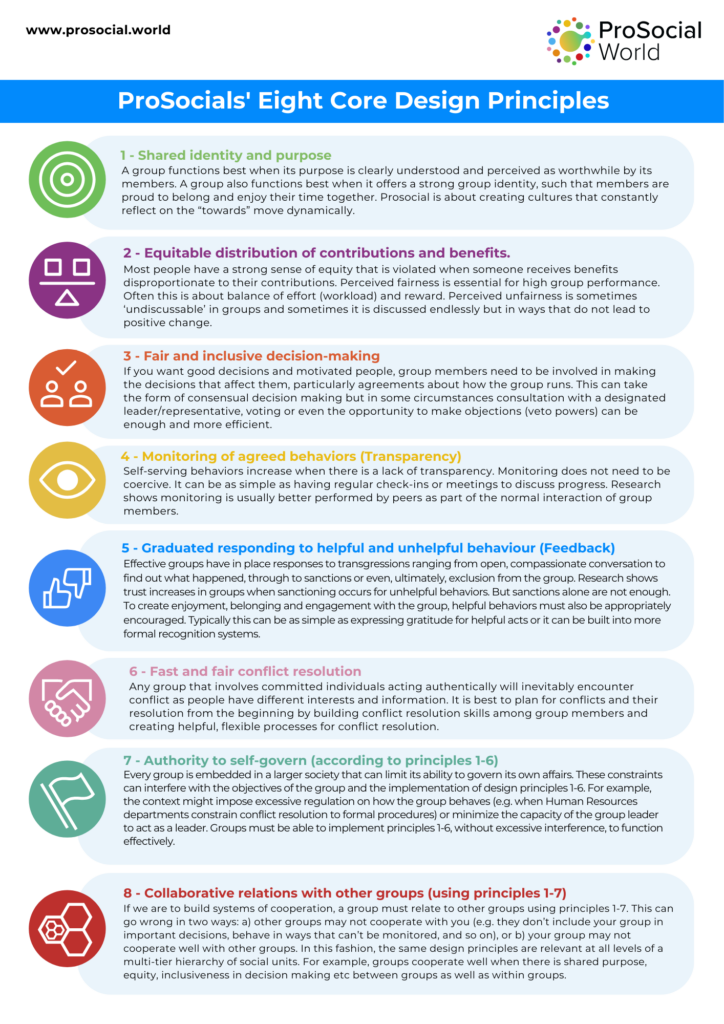
Public sector leaders increasingly have to do their work across organisational boundaries with a complex mix of multiple stakeholders including First nations peoples, unions, organisations, and communities. In these circumstances, leaders cannot rely on their authority to get things done, and they need to build collaboration from the ground up. Improving collaboration in such complex situations requires leaders to understand the psychology behind collaboration, says organisational psychologist Associate Professor Paul Atkins.
A/Prof Atkins is a social and organisational psychologist, facilitator, speaker, mediator, coach, and researcher. He developed the ProSocial suite of learning experiences at ProSocial World, a nonprofit organisation he founded that focuses on enhancing cooperation and trust in mission-driven groups globally.
He will deliver a masterclass in ANZSOG’s upcoming Leading Through a Different Lens: Public Leadership Masterclass Series showing leaders how to create more collaboration on complex issues like Closing the Gap, national emergencies and climate change by addressing the psychological obstacles which can prevent their teams from collaborating effectively.
He said that ProSocial’s work was based on research that showed that successful collaborationss had eight things in common (see graphic below) and that failing in any one of these areas could lead to blockages in collaboration.
“These principles didn’t come from nowhere. They came from the Nobel Prize winning work of Elinor Ostrom, which analysed how groups have collaborated over long periods to effectively manage common resources like fisheries and water supplies. She found they don’t have any sort of formal single processes in common, but the effective ones all adhere to these eight core design principles,” he said.
“What we’ve then done is go back and look at the management and psychological literature and find evidence for all of those core design principles are critical for effective collaborations.”

Building and maintaining collective purpose
Professor Atkins said that the most important principle for public sector leaders was to build and maintain a sense of purpose within their collaborative projects.
“Loss of a sense of shared purpose and values is a huge barrier to collaboration. We all know in the public service you can rapidly lose sight of purpose, and who you are serving, and get lost in process and procedures and policies.
“The second big barrier I think is inequity or unfairness and this comes from this inability to talk about people’s needs. Part of addressing this is having these win-win conversations where you’re seeking to create an environment where everyone’s needs are met as much as possible,” he said.
“The third main obstacle that I want to talk about is the ways we make decisions together. This is a big one because there are many different decision models ranging from pure top-down, authority driven decision-making at one extreme, to consensus at the other.
“Between the two there are models that retain some degree of efficiency, but move us a bit more toward inclusion and valuing of everyone’s opinion. I would point to what’s called the ‘advice process’ and ‘consent-based decision making’.”
“The advice process is where you empower someone to be a project owner to address a particular challenge in the organisation. The project owner then goes out and seeks advice from various people and then makes a recommendation regarding how that challenge should be addressed. Of course, that proposal can then have different approval processes, but it’s a way of actually empowering people to do work that can make a difference.
“Consent-based decision making is further towards the consensus end. It is based on giving everyone the opportunity to object to something. You put out a proposal and then ask ‘does anyone have any substantive objections to this?’ It’s not about asking if this is everyone’s preferred solution, it’s more about asking ‘will this do us any harm?’ and of course that that makes it a much lower bar to get consensus.”
Professor Atkins said that even in the process-driven, risk-averse world of the public service it was possible to create collaborative and innovative cultures within small teams and the opportunities are even greater where established methods such as authority-based management simply do not work, like bringing together diverse stakeholders.
Natalie James, secretary of DEWR would appear to agree. She is quoted in a recent edition of the Mandarin as saying: ““The APS has an opportunity to reduce formality and increase responsibility to all members of our exceptional and committed workforce. And to work in a way that’s more fluid and organised around the project or issue as opposed to just doing it the traditional, hierarchal APS way.”
The qualities leaders need
A/Prof Atkins thinks this approach is exactly what is needed, but it is not easy to do when we are stuck in traditional ways of thinking, feeling and making sense of the world. What is needed is a new set of skills of meaning making and responding more consciously. Good leaders not only have the ability to clarify their own needs, values and goals, they can also work with a group to integrate diverse aims. There are also a range of other qualities that help drive collaboration.
“They need perspective and the capacity to see perspective of others in the system and to be able to reflect that to them so that they can build relationships. They need emotional self-regulation, which comes out of self-awareness so they are able to recognise when they’re getting triggered by something and trying to protect a particular identity,” he said
“Then of course there’s communication skills to be able to express all of that in a way that’s literate and clear and linked to purpose.”
He said that the Masterclass would look at six skills and behaviours that could be used by public sector leaders to support the principles of collaboration summed up by the words valuing, attending, feeling, thinking, selfing and acting.
Valuing is about skillfully working with the goals, needs and values of themselves and others.
Attending is about noticing what matters in the present moment, not getting caught up in fears about the future or judgments about the past.
Feeling is about emotional self-regulatory capability, being able to use feelings effectively rather than being dominated by them.
Effective thinking, in this context, is about cognitive flexibility, being able to step back and recognise your thoughts as something that flows through you rather than necessarily the truth.
“Selfing” is a kind of shorthand for how we construct a sense of who we are, our own identities. Atkins says “The fifth one applies to a lot of what I see going wrong in public service, which is people protecting their particular identities – as ‘an expert’, as ‘a person in charge’ – and this is something that can cause or exacerbate conflict. If you’re aware of it, then you can ease up on it, and be more open to the needs of others.
Acting in this context is focused on being able to listen reflectively and communicate effectively by giving good information about ourselves.
A/Prof Atkins said his main piece of advice to public sector leaders would be to ‘focus on goals, values and needs in as many contexts as possible’.
“Do that consciously, actually make it a part of your meetings or your other discussions to consciously focus on purpose,” he said.
“It’s particularly important for the public service because the whole point of the public service is creating forms of value beyond money. If the public service is to play its role in creating the sort of society we want, we need to be more conscious about balancing and integrating the needs, values and goals of many stakeholders, and finding ways to collaborate that are more flexible than relying on authority. I think that’s one of the key differences between the public and private sector.”
ANZSOG’s Leadership Through Different Lenses: Public Leadership Masterclass series (PLM) will provide a space for reflection and a chance for leaders to re-energise their thinking through exposure to new ideas.
PLM recognises that public leadership is strengthened by an ability to see things from multiple perspectives, and that leaders need to think more creatively to solve complex problems, and avoid falling into the same flawed patterns of thinking.
The five masterclasses in Leadership Through Different Lenses are:
- Leading in complexity with Marianne Stacey and John Sautelle
- Power dynamics and influencing for long-term success, Jen Overbeck
- Overcoming obstacles to collaboration, Paul Atkins
- High performing teams, Robin Ryde
- Mastering ethical leadership, Karin Lasthuizen
More information about the Public Leadership Masterclass series is available here including session times and pricing, including discounts for group bookings.
